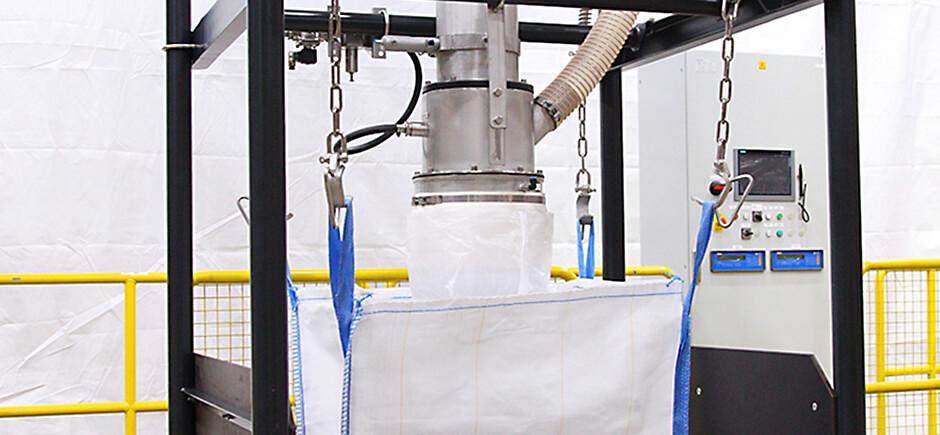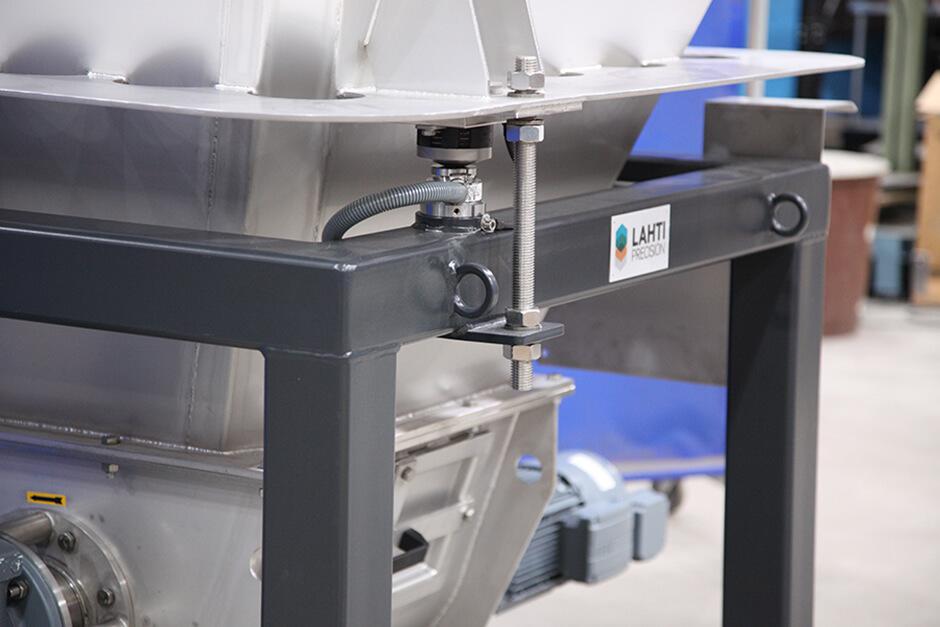Sustainable approaches, climate-aware decisions and digitalisation have increased the demand for electric equipment and vehicles over the past few years. As a result of electricity becoming a more common source of power, the battery industry has also increased sharply in production volume.
Our decades’ worth of experience in handling bulk materials and solid expertise in weighing, dosing and conveyor technology (incl. ATEX) provide considerable added value to battery industry operators. Moreover, our holistic approach to solution design enables us to offer an extensive service, ensuring that all of your weighing and dosing related needs are addressed smoothly, efficiently and with as few variables as possible.
Our modular concept can be tailored to any needs
The traditional lead-acid batteries have become less common while the number of lithium-ion batteries, used in electric cars for example, has increased. Their main materials include lithium, nickel, cobalt and manganese, which are used in the cathodes, as well as graphite, which is used as an anode material.
We have successfully developed a modular concept that can be tailored for various purposes to meet the individual needs of every sector. Our big bag solutions are versatile and can be perfectly adapted to battery industry processes as well. The concept that we have designed for the battery industry focuses on utilising valuable materials like lithium, cobalt and nickel efficiently by automating the handling of big bags. Our modules can be used to create cathode material handling systems that work in a process-like fashion and, subsequently, boost every operational aspect. And when it comes to lithium and transition metals, occupational health and safety, as well as dust-free working environments, must be taken into consideration. In these instances, a highly automated filling system is the answer.

Bag handling equipment and dosing systems for cathode material processing
In practice, the process begins with the packaging of the material during the final production phase at the source. After that, the battery materials like lithium, cobalt and nickel pass through numerous logistical transfers and production process phases. The battery industry needs bag handling machines and dosing systems for the smooth, efficient and safe processing, storing and transporting of cathode materials and their precursors. Most of the materials are delivered in containers, barrels, drums or big bags due to the geographical location and operational capacity of the mines and refineries. The big bags are by far the most cost-effective and common of these options.
Big bags are typically emptied directly into a weighed mixing container or intermediate storage, from where the material can be dosed straight into a mixing container or elsewhere in the process through subtractive weighing. Battery materials can be unloaded and transported to another location by using pneumatic transmission. Additionally, depending on the process requirements, various methods are available for dosing the materials, such as continuous and batch dosing.
When receiving packaged material after its transport, the reception container or bag must be emptied sufficiently well in order to minimise material losses. The material may also require some pre-treatment, e.g. due to caking, to allow it to be processed. Some of the pre-treatment can be carried out with massagers or lump breakers.
From the unloading location, the material is either transferred to an intermediate storage or fed directly into the process, which will have a significant effect on the transport method. Thanks to being energy efficient, the recommendation is to use gravity as much as possible in the dosing.
Our solutions for the process area
(The same control system and its interfaces for DCS and/or ERP systems)
Bag unloading station
- Bag massager/pre-treatment implement
- Dust-proof unloading station
- Lump breaker
- Dosing and transfer equipment
- Potential mixer underneath the dosing
- Option of bag identification and feed stopper (barcode reader)
Dosing dispensers for the process
- Continuous and batch dosing
- Perfect dispensers for every material and dosing requirement
- Dosing capacity from grams to tonnes
- Precision optimised according to application
Bag loading stations
- Dust-proof filling nozzle
- Bags filled to non-specific or specific weight
- Option of commercial weighing.
Safety through systems as free from dust as possible
The materials and their combinations needed in battery production are generally harmful and lethal when inhaled due to their small particle size. In order for their processing to comply with the relevant occupational health and safety regulations, it must be carried out dust-free by utilising appropriate ventilation. When deciding on the equipment, it is important to consider the method and level of the isolation and ventilation of the equipment.
In order to achieve a safe and healthy working environment, the occupational health and safety officials’ guidelines state that at least a minimum ventilation is required in any space where the materials are handled. With the most hazardous materials, components such as special valves that isolate the material flow must be used. Alternatively, the processing environment must be completely isolated, for example to form an air-tight enclosure, which allows the process to be separated from the clean usage environment. Isolation is often carried out locally and the processing is performed with gloves. The isolated area may also be larger, but this often requires a much higher level of automation. Finally, production plants should, of course, ensure access to appropriate PPE.

Equipment components and materials to match ATEX directive requirements
Powdered materials may generate dust easily while being processed, so for this reason alone, a risk assessment may conclude that the equipment is part of an explosion hazard area and governed by the ATEX directive. As an experienced and competent equipment supplier, we have the necessary understanding and expertise to select the correct components to allow equipment to adhere to the directive and cause no risk of explosion.
Many of the substances handled in the battery industry are also corrosive or oxidizing, and therefore they may be harmful to the materials that the equipment is made of. In such cases, at least the materials of those parts that will come into contact with these substances should be carefully selected.
Take control of material flows with digital service
It is also necessary to record data on the battery industry work phases for the logistics and other parts of the process. Our mScales service helps data accumulated during the material processing and weighing to be distributed to all stakeholders in a timely manner, regardless of their location. mScales can also be integrated into a company’s operating systems, allowing the data to be passed on completely automatically without a risk of human error, for example for stock management and invoicing purposes. The aim is to be able to monitor the material flows fully and use the data accumulated to control the flows.
Service from needs assessment to maintenance and spare parts
We offer more than just a product or a delivery; we strive to take our clients’ needs into account through our comprehensive service. From the first contact made and the initial needs assessment, we move on smoothly to designing, manufacturing and delivering the equipment. However, this will not be the end of the clientship, as the agreement will state that our service includes the installation, implementation services and possibly also maintenance. Furthermore, spare parts are readily available for the equipment we produce with swift and agile deliveries.
As a matter of fact, our greatest strength is our holistic approach: we are able to utilise the experience possessed by our entire organisation to serve our clients, and take all of our clients’ needs, preferences and requirements into account, creating the perfect equipment combinations. Moreover, we also factor in the timescale of our designs, i.e. a system’s lifecycle.
Want to know more? Contact us
Juha Immonen
Sales Manager, Dosing and Weighing systems
+358 50 370 4221
juha.immonen@lahtiprecision.com
Janne Kousa
Vice President, Technology and Engineering
+358 40 8604 501
janne.kousa@lahtiprecision.com
Download the guide to battery industry’s weighing and dosing solutions
In this guide, we tell you about the factors to consider when choosing weighing or dosing solutions for the battery industry.
Efficiency for battery metals production with mixing solutions
Due to the increased demand for battery metal applications, we have developed our concepts to be able to match the needs to this industry as well.
Solid experience has also been harnessed for the needs of the battery industry
The concept we have designed for the needs of the battery industry emphasizes in particular that valuable materials can be efficiently utilized by automating the handling of big bags.
Dosing in battery metals’ production process
Strong knowledge of the properties of battery raw materials and experience in their handling and dosing technologies ensures an efficient and reliable production process.
Cost-effective system deliveries for processing battery materials
An efficient and reliable process for manufacturing batteries with a complete solution. One party takes overall responsibility for the functionality of the process.
Tamtron's solutions contribute to Fortum's move towards a carbon-neutral economy
Tamtron has supplied demanding weighing and dosing technology for handling the primary raw material flows to Fortum's hydrometallurgical battery recycling plant in Harjavalta.
Download the guide to battery industry’s weighing and dosing solutions
In this guide, we tell you about the factors to consider when choosing weighing or dosing solutions for the battery industry.
Read more